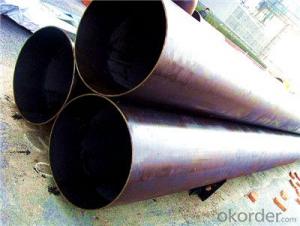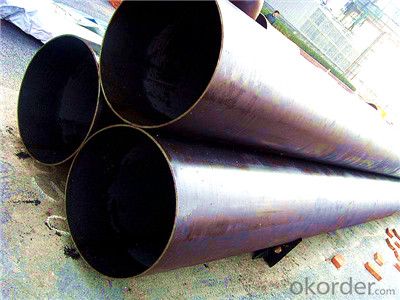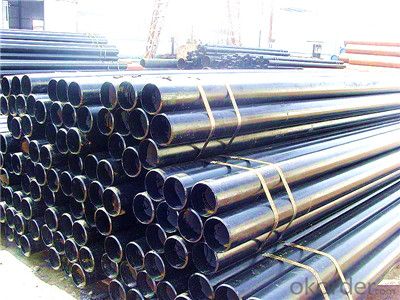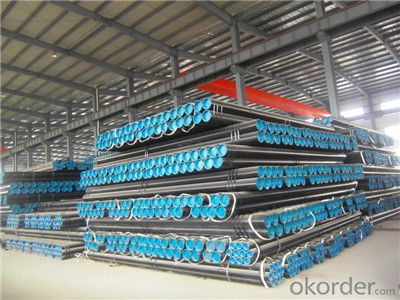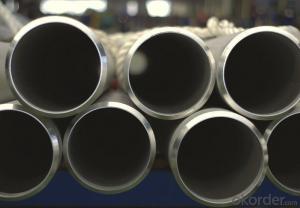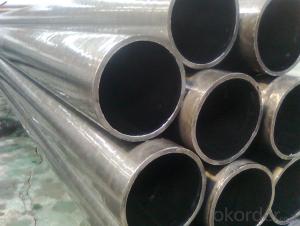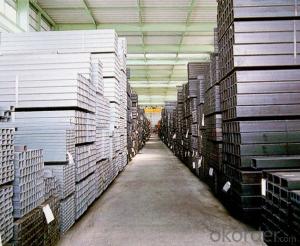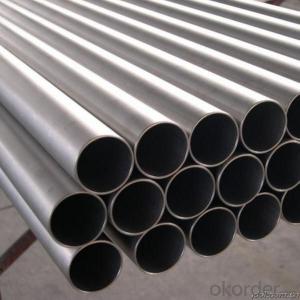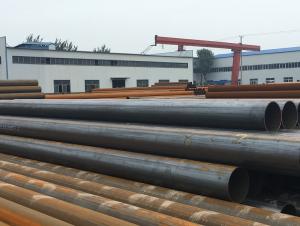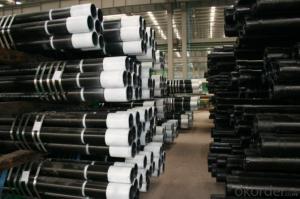ow price eamless teel pipe with high quality
- Loading Port:
- Tianjin
- Payment Terms:
- TT or LC
- Min Order Qty:
- 50 m.t.
- Supply Capability:
- 2000000 m.t./month
OKorder Service Pledge
OKorder Financial Service
You Might Also Like
PRODUCT DETAILS
1.Structure of Seamless Steel Pipe Description:
A large amount of Seamless Steel Pipes is offered to the clients at cost effective rates. These pipes are extremely durable, resistant to corrosion and have high tensile strength. Our pipes are used in nuclear plants, power plants, refineries and construction industry across the country. Furthermore, we are capable of providing these seamless pipes to the clients in bulk quantity.
2.Main Features of the Steel Pipe:
• High manufacturing accuracy
• High strength
• Small inertia resistance
• Strong heat dissipation ability
• Good visual effect
•Reasonable price
3.Packaging & Delivery:
| Packaging Details: | Seaworthy packages, bundles wrapped with strong steel strip |
| Delivery Detail: | 15-30 days after received 30% TT |
4.Seamless Steel Pipe Specification:
| Standard: | GB, DIN, ASTM,ASME, ASTM A106-2006, ASTM A53-2007 |
| Grade: | 10#,20#, 45#, 16Mn |
Thickness: | 8 - 33 mm |
| Section Shape: | Round |
| Outer Diameter: | 133 - 219 mm |
| Place of Origin: | Shandong, China (Mainland) |
| Secondary Or Not: | Non-secondary |
| Application: | Hydraulic Pipe |
| Technique: | Cold Drawn |
| Certification: | API |
| Surface Treatment: | factory state or painted black |
| Special Pipe: | API Pipe |
| Alloy Or Not: | Non-alloy |
| Length: | 5-12M |
| Outer Diameter: | 21.3-610mm |
5.Product pictures
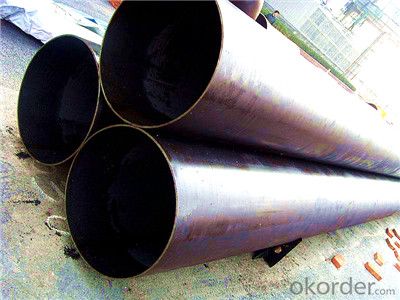
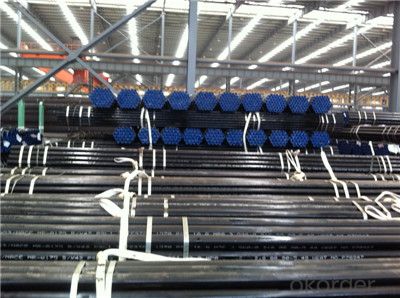
5.FAQ of Seamless steel pipe:
①How is the quality of your products?
Our products are manufactured strictly according to national and internaional standard, and we take a test
on every pipe before delivered out. If you want see our quality certifications and all kinds of testing report, please just ask us for it.
Guaranteed: If products’ quality don’t accord to discription as we give or the promise before you place order, we promise 100% refund.
②How about price?
Yes, we are factory and be able to give you lowest price below market one, and we have a policy that “ for saving time and absolutely honest business attitude, we quote as lowest as possible for any customer, and discount can be given according to quantity”,if you like bargain and factory price is not low enough as you think, just don’t waste your time.Please trust the quotation we would give you, it is professional one.
③Why should you chose us?
Chose happens because of quality, then price, We can give you both.Additionally, we can also offer professional products inquiry, products knowledge train(for agents), smooth goods delivery, exellent customer solution proposals.Our service formula: good quality+good price+good service=customer’s trust.
SGS test is available, customer inspection before shipping is welcome, third party inspection is no problem.
Any question, pls feel free to contact us !
- Q: What does "steel pipe SC" mean?
- SC is an ordinary welded pipe, equal to water professional DN, SC is welded steel pipe concealed, general pipe wall is relatively thick, S represents pipe material, C represents laying mode, TC stands for wire pipe concealed, pipe wall is thinner.
- Q: How does the price of steel pipes vary based on size and grade?
- The price of steel pipes tends to vary based on their size and grade. Generally, larger pipes and higher-grade steel tend to have higher prices due to the increased raw material and manufacturing costs involved. However, market demand and supply dynamics can also play a role in the price fluctuations.
- Q: How are steel pipes threaded?
- Threading, a process that involves creating screw-like grooves on the outer surface of steel pipes, enables their connection to other pipes or fittings using threaded connections. Steel pipes can be threaded through various methods, including manual threading, electric threading machines, and hydraulic threading machines. Manual threading employs a handheld pipe threading tool called a die. The die is positioned on the outside of the pipe, and while pressure is applied, the pipe is rotated to generate the threads. This technique is suitable for smaller diameter pipes and is commonly used for on-site repairs or in smaller operations. For larger diameter pipes, electric threading machines are commonly used. These machines consist of a motor-driven spindle that rotates the pipe and a die head that houses the threading dies. The operator simply feeds the pipe into the machine, and the threading dies automatically cut the threads onto the pipe. Hydraulic threading machines, similar to electric threading machines, utilize hydraulic power to rotate the pipe and create the threads. These machines are typically employed for larger diameter pipes or heavy-duty applications. Irrespective of the method employed, it is crucial to properly prepare the pipe before threading. This may involve cleaning the pipe, eliminating any burrs or sharp edges, and applying a lubricant to minimize friction during the threading process. In conclusion, threading is a widely used and efficient technique for establishing threaded connections on steel pipes. It facilitates easy assembly and disassembly of pipes and fittings, making it a popular choice in industries such as plumbing, construction, and oil and gas.
- Q: What is the role of steel pipes in the transportation of liquefied natural gas (LNG)?
- Due to their unique properties and characteristics, steel pipes are essential in the transportation of liquefied natural gas (LNG). LNG is a form of natural gas that is cooled to a liquid state for easier transportation and storage. Specific infrastructure is required for the transportation of LNG, and steel pipes are a crucial part of this infrastructure. To begin with, steel pipes are used in the construction of LNG terminals and liquefaction plants. These facilities are responsible for converting natural gas into its liquid form and storing it prior to transportation. The extremely cold temperatures needed to maintain LNG in its liquid state necessitate the use of materials that can withstand these conditions, and steel pipes are well-suited for this purpose. Steel pipes possess excellent strength and durability, enabling them to handle the low temperatures and high pressures involved in the liquefaction and storage processes. Additionally, steel pipes are employed in the transportation of LNG from the liquefaction plants to the storage tanks or shipping vessels. LNG is typically transported over long distances, either through pipelines or specialized LNG carriers. Steel pipes are utilized in the construction of underground or above-ground pipelines, providing a reliable and safe means of transporting the LNG. The pipes must be capable of maintaining the low temperatures of the LNG while enduring the pressures and stresses associated with the transportation process. Steel pipes offer the necessary strength, corrosion resistance, and thermal properties to ensure the safe and efficient transportation of LNG. Finally, steel pipes are also utilized in the construction of storage tanks for LNG. These tanks are designed to keep the LNG in its liquid state until it is ready for use or further transportation. The tanks are often constructed using a combination of steel plates and steel pipes. Steel pipes are employed to connect the various components of the tank, such as the inner and outer shells, reinforcing the structural integrity of the tank and guaranteeing its ability to withstand the extreme conditions to which it is exposed. In conclusion, steel pipes are vital in the transportation of liquefied natural gas (LNG) due to their strength, durability, and ability to endure low temperatures and high pressures. From the construction of LNG terminals and liquefaction plants to transportation through pipelines or specialized vessels, steel pipes are a crucial component of the infrastructure required for the safe and efficient transportation and storage of LNG.
- Q: How do you calculate the stress in a steel pipe?
- To calculate the stress in a steel pipe, you need to determine the applied force or load acting on the pipe and divide it by the cross-sectional area of the pipe. This will give you the stress value, which is typically measured in units of force per unit area (such as pounds per square inch or pascals).
- Q: Are steel pipes suitable for hydronic heating systems?
- Yes, steel pipes are suitable for hydronic heating systems. Steel pipes are known for their durability, strength, and resistance to high temperatures and pressure, making them an excellent choice for circulating hot water in hydronic heating systems. They can effectively handle the demands of heating systems and provide reliable and long-lasting performance.
- Q: How are steel pipes used in the textile industry?
- Steel pipes are used in the textile industry for various purposes, including the transportation of water, steam, and chemicals, as well as for the distribution of compressed air. They are also used in the construction of machinery and equipment, such as dyeing machines and fabric stretching frames. Additionally, steel pipes are utilized for the installation of heating and cooling systems in textile factories.
- Q: How do steel pipes perform in earthquake-prone regions?
- Steel pipes perform well in earthquake-prone regions due to their high strength, durability, and flexibility. The inherent properties of steel, such as its ability to absorb energy and distribute stress, make steel pipes resistant to seismic activity. Additionally, steel pipes can be designed and installed with specific measures to further enhance their seismic performance, ensuring the safety and reliability of infrastructure in earthquake-prone areas.
- Q: Are steel pipes environmentally friendly?
- Steel pipes can be considered environmentally friendly for several reasons. Firstly, steel is a highly durable and long-lasting material, which means that steel pipes have a longer lifespan compared to other materials like plastic pipes. This reduces the need for frequent replacements and repairs, reducing waste and conserving resources. Secondly, steel is a highly recyclable material. At the end of their lifespan, steel pipes can be easily and efficiently recycled, without losing their properties or quality. This reduces the demand for new steel production, which often requires significant amounts of energy and resources. Furthermore, steel pipes have a high resistance to corrosion, which means that they require fewer chemical treatments to prevent rusting and maintain their structural integrity. This reduces the release of harmful chemicals into the environment and minimizes the impact on ecosystems and human health. It is also worth mentioning that steel pipes are used in various industries, including water supply and wastewater management. Steel pipes are known for their excellent strength and reliability, ensuring the safe and efficient transportation of fluids. This reduces the risk of leaks and spills, preventing contamination of water sources and protecting the environment. However, it is important to note that the production of steel pipes does have some environmental impact. The extraction of raw materials, such as iron ore and coal, requires energy and can contribute to deforestation, habitat destruction, and greenhouse gas emissions. Additionally, the manufacturing process itself generates emissions and waste. Overall, while steel pipes may not be completely free from environmental impact, their durability, recyclability, and resistance to corrosion make them a relatively environmentally friendly choice compared to other materials.
- Q: Are steel pipes resistant to chemicals?
- Yes, steel pipes are generally resistant to chemicals. However, their resistance may vary depending on the specific type of chemical and the grade of steel used. Some chemicals may cause corrosion or degradation of the steel over time, so it is important to consider the compatibility of the pipe material with the intended chemicals before use.
Send your message to us
ow price eamless teel pipe with high quality
- Loading Port:
- Tianjin
- Payment Terms:
- TT or LC
- Min Order Qty:
- 50 m.t.
- Supply Capability:
- 2000000 m.t./month
OKorder Service Pledge
OKorder Financial Service
Similar products
Hot products
Hot Searches
Related keywords
